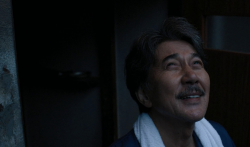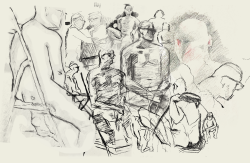I attended a reading by prolific contemporary poets C.K. Williams and Stanley Plumly at the Folger Shakespeare Library this Monday, and I was scared. I know nothing about poetry, and, aside from the very little I read in high school English class, I have never branched into the genre. I, like some other nervous readers comfortable in their familiar prose, have avoided meter for far too long.
I’m going to tell you—and I don’t know how much you should trust my word, since I am a total novice—but I’m going to tell you that poetry is nothing to be scared of. In fact, we should embrace it, arms wide and ears open, and there is no better way to jump in than by going to a poetry reading.
First of all, and most importantly, something that may assuage your fears, is that poets are funny. Really, really, funny. Picture this old white guy, big glasses, mussed hair, tie askew and corduroy blazer askance, who walks up to the mic at your very first poetry reading and says, “I’m going to start with a poem about sex.”
C.K. Williams, the poet in question, went on to outperform all of my expectations. I proclaim C.K. Williams as funny as Louis C.K. (And I don’t take that assertion lightly, but Williams had me in stiches.)
His humor was Woody Allen-esque—a bit neurotic, self-effacing yet egotistical and histrionic to boot. His work is saturated with wit and cleverness, coupled with a sense for the aesthetic visceral pleasure one gets out of rich compilations of words. I was bowled over.
I hadn’t been expecting this, because (with some hesitation and little result) I had read Williams’ poems before the event. I didn’t enjoy them nearly as much as when he read them aloud, and, to get the full experience, his poems ought to be performed.
Reading the poetry alone was much more challenging than my usual obsessive procrastination of schoolwork via novel. Length-wise, there was much less to tackle in these books of poetry than in a novel. But poetry requires a more concentration, focus, and proximity.
Still, my favorites from Williams’ most recent collection, entitled Writers Writing Dying, were the ones addressing writing, including “Whacked,” which he performed at Monday’s reading, along with the titular poem. Unfortunately, his political poems were contrived and easy to dismiss.
Stanley Plumly, the other well-known poet to headline Monday’s reading, is just as prolific as C.K. Williams. In contrast to Williams’s humor, Plumly’s work is primarily touching. The poet’s skill ismost evident in his ability to weave together completely unrelated events in an intricate, shimmering whole, even if you don’t understand exactly how it fits so well together.
The best example, which he read with a quiet command, was “The Crows at 3 a.m.” It smoothly combines all sorts of imagery, including “politically-correct” snow, insomnia, Fitzgerald, his mother’s hands, and the crows, all in just two stanzas. Plumly is also talented at capturing a singular moment, as he does in the best poem I’ve read by him: “Woman on Twenty-Second Eating Berries.”
“She’s not angry exactly but all business,/eating them right off the tree, with confidence,/the kind that lets her spit out the bad ones/clear of the sidewalk into the street./…/In the air/the dusting of exhaust that still turns pennies/green, the way the cloudy surfaces/of things obscure their differences,/like the mock orange or the apple rose that/cracks the paving stone, rooted in the plaza.”
The interplay between the two poets made their respective work pop. They last read together at the Folger in 1986, when, as they recalled, they were young and at their most famous. There was a comforting balance between Plumly’s coarse, strong, calm vibrato with Williams’ energetic, New Jersey-accented tone.
You get this balance if you read them, too, but they are particularly potent in person. I can’t think of a better introduction to the world of poetry than hearing it at its best by its own authors.
Still, I never quite lost the consciousness that I was at a poetry reading, listening to a recital, reveling in the selfish pleasure that is good words for my own sake.
I look forward to branching out. There are monthly poetry readings here on campus, if you want an interesting introduction in a familiar place. The Lannan program often hosts authors in Copley formal and the Bioethics library. I’ll definitely be seeing Charles Simic, who is coming to the Folger on Monday, Nov. 18. Because when poetry demands to be read out loud, it needs an audience.




